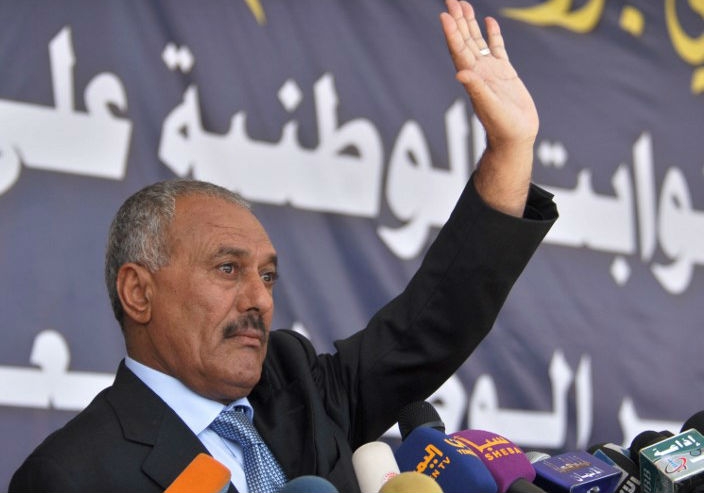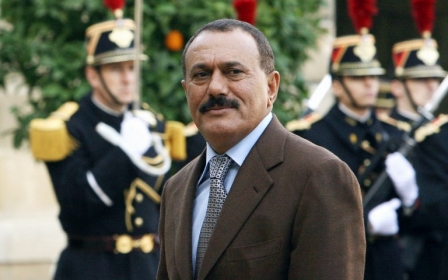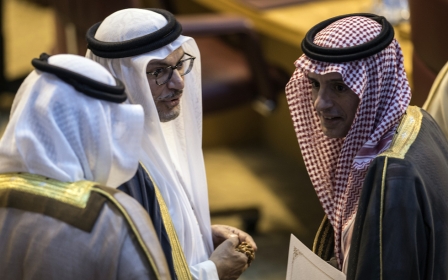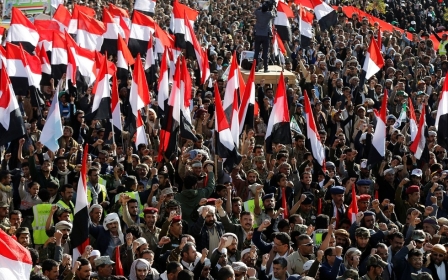Arabic press review: Saleh saw his own end, and died for his mistakes

Saleh knew it was coming
In what is thought to be the final interview Saleh gave before he was killed, he told Kuwaiti newspaper Al-Rai that he expected the Houthis to kill him.
According to Al-Rai, he told the paper on Sunday that he believed that the Houthis planned to "exterminate him along with a number of his family members".
After he made the comment, Saleh asked that the statement be attributed instead to a leader in his party, the General People's Congress, because of the sensitivity of the situation.
"The time of coexistence between the state and the militia is over," he told the paper on Sunday.
"But it turned out that the thought of the militia was faster than [his] political savvy," Al-Rai commented.
The Houthis stand alone
After killing their former partner, the Houthis will see all doors of cooperation shut for them in Yemen, writes Saudi newspaper Al-Sharq Al-Awsat.
Citing Yemeni political sources, the paper said Saleh's death, along with two of his sons and several party leaders, has angered Yemenis and has lost the Houthis the political cover of the General People's Congress, the party the former president led.
The Houthis will now find themselves in direct confrontation with tribes and forces that opposed the 2014 coup in which the group, with Saleh's help, took Sanaa.
Tyranny can't last
There are two important lessons to be drawn from Saleh's killing, according to the London-based newspaper Al-Quds Al-Arabi editorial which ran on Tuesday.
The first is that tyranny will never remain no matter how many years and decades it might last. "The man who spent 32 years building a system based on corruption, buying family and tribal loyalties, playing contradictions ... needed a shot in the head to leave the dance with snakes to a place where history would only be met by tyrants," the paper wrote.
The second lesson is that the Houthis will achieve nothing, only more killing and the dismantling of unity in the country.
"Saleh was the last Arab ruler within a whole dynasty of rulers who established tyrannical and corrupt regimes and got used to the monopolisation of power for decades, but then failed to stop the cycle of history, which proves that a state built on injustice will only last for a short time," the editorial concludes.
The last dance
In the face of American-Saudi aggression against Yemen, Saleh failed to hold onto the true power of the Yemeni people and maintain national unity, according to Lebanese newspaper Al Akhbar which is close to Hezbollah.
"The Yemeni people, with its army, popular committees, tribes and national parties, have become a mythological epic ... a school of sacrifice and patience," the paper writes.
At a regional level, his killing reflects the extent to which Saudi Arabia, the UAE and Egypt - which the writer calls "the so-called axis of moderation" - has failed in Syria, Iraq and Yemen in contrast to "the resistance axis".
History will forgive Saleh for working with Saudi in the end because "this dependence was to spare the country from sliding into sedition, in light of the imbalance of power in favour of the Saudi side".
But it was also his "last recklessness" - calling for a new dialogue and working in conjunction with Riyadh to intimidate the Houthis - that led to Saleh's last dance.
Golden opportunity
The Arab coalition - the Saudis, UAE and pro-Abd Rabbuh Hadi forces - fighting against the Houthis are lucky that the rebels killed Saleh, not them, writes Abdullah Majali in Jordan's Al-Sabeel.
His death is a good opportunity to attract tribal and military supporters of Saleh to join the coalition against the Houthis who now rule Yemen alone, Majali said.
Saleh’s fatal mistake
Saleh made a huge mistake when he cooperated with the Houthis, but he corrected himself in his final days, Jamal Jabari, a Yemeni diplomat in Cairo, said during a TV interview with the CBC satellite channel.
The former president paid with his life for the mistake, the Egyptian newspaper Al-Mesryoon quoted Jabari as saying.
"The majority of Yemenis who supported Saleh will join the national forces against the threats the country will face," he said.
* Arabic press review is a digest of reports that are not independently verified as accurate by Middle East Eye.
Middle East Eye propose une couverture et une analyse indépendantes et incomparables du Moyen-Orient, de l’Afrique du Nord et d’autres régions du monde. Pour en savoir plus sur la reprise de ce contenu et les frais qui s’appliquent, veuillez remplir ce formulaire [en anglais]. Pour en savoir plus sur MEE, cliquez ici [en anglais].




